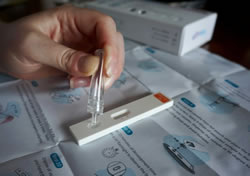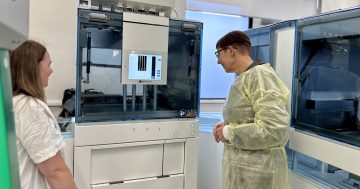 The ACT’s Chief Health Officer Dr Kerryn Coleman has outlined the new requirements for COVID-19 household contacts following the easing of quarantine requirements yesterday (27 April).
The ACT’s Chief Health Officer Dr Kerryn Coleman has outlined the new requirements for COVID-19 household contacts following the easing of quarantine requirements yesterday (27 April).
Dr Coleman said household contacts of confirmed COVID-19 cases must minimise their movement in the community and comply with risk mitigation requirements for seven days from the time the first person in their household tests positive.
“A person who is a household contact is at highest risk of contracting COVID-19, compared with other exposures, due to the nature of contact between individuals in a household,” Dr Coleman said.
“However, I recognise that certain workforces are under significant pressures due to these quarantine requirements – while from a wellbeing perspective there is also a need to reduce the burden on families and individuals,” she said.
“So, while these risk mitigation requirements allow people to leave quarantine for necessary activities that cannot be postponed or delayed, ACT Health continues to recommend that household contacts seek to minimise their movement within the broader community wherever possible.”
Dr Coleman said that if a household contact had, or developed, even the mildest COVID-19 symptoms they weren’t permitted to leave their home, must get tested and isolate until a negative result was received.
“Even if they have a negative test result, they should stay at home until they are symptom-free,” the Chief Health Officer said
“Individuals will need to take personal responsibility in assessing the reason to leave home and whether this can be postponed or delayed.”
She said household contacts were required to advise ACT Health of their status; wear a face mask indoors when not at home; notify their employer and/or educational facility; and work or study from home where practical.
“Household contacts are also not permitted to enter a high-risk setting during the seven days unless an exemption has been granted by the relevant setting.”
She said if it was not practical to work or study from home, and a mutual agreement to attend had been struck, individuals must return a negative COVID-19 test result in the 24 hours prior to returning and then every 48 hours if ongoing attendance was required.
Dr Coleman encouraged businesses to provide rapid antigen tests to staff who they wished to return to the workplace.
“The ACT Government can provide rapid antigen tests for those household contacts who cannot obtain them from their workplace or where they would experience financial hardship,” she said.
“Outside the home, household contacts should also continue to practice COVID Smart behaviours.”
Further information on risk mitigation requirements for household contacts can be accessed at this PS News link.











